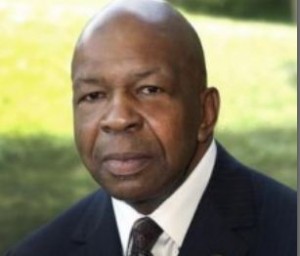
Elijah Cummings
As we celebrate Black History Month and learn from our past, we cannot help but acknowledge the truth of Asa Phillip Randolph’s insight. As the famous labor and civil rights organizer once observed, our struggles for civil rights and economic justice have always been inextricably linked.
It was Mr. Randolph’s leadership, after all, that brought the Brotherhood of Sleeping Car Porters into what is now the AFL-CIO. He would later be in the forefront of organized labor’s support for the integration of America’s defense industry and armed forces — and without his vision and organizational skill, the 1963 March on Washington for Jobs and Freedom might never have occurred.
The transformative power of Labor’s commitment to both civil rights and economic justice has been demonstrated in the lives of thousands, if not millions, of American families, my own included.
Because of what A. Phillip Randolph accomplished in convincing President Roosevelt to integrate our defense industry, my father was able to get a union job at Davison Chemical in South Baltimore.
Because of the better wages, health plan and other benefits that the union assured, my parents were able to purchase a small home and educate all seven of their children, transforming our lives for the better.
Blacks who are fortunate enough to be union members have comparable opportunities today. They earn, on average, $174 each week more than their non-union counterparts in similar jobs — and are more likely to have employer-provided health insurance and retirement plans.
In broader perspective, union employment in both the private and public sectors has been a major force in the expansion of the Black middle class — the very Americans who remain at the forefront of the civil rights movement of our time.
It also is a historical fact, however, that relentless attacks upon the ability of working families to effectively organize and advocate for our economic rights have been directly related to the growing inequalities in incomes and wealth that our nation is experiencing today.
Workers’ wages have been stagnant for years, despite growing productivity and expanding prices. Economists like Nobel Prize Winner Joseph Stieglitz and organizations from the International Monetary Fund to the Economic Policy Institute and Center for American Progress have concluded that the decline in worker bargaining power is a major cause of that disparity.
Those who are hostile or indifferent to the cause of Blacks — both as citizens and as human beings who must earn a living — have realized this interconnection between civil rights and labor rights all too well. That is one of the reasons why attacks upon our voting rights seem always to arise in tandem with parallel challenges to our ability to organize unions at our workplaces.
Our 21st Century civil rights struggle is playing itself out in our state legislatures and the Congress — in the presidential campaigns that are currently underway and in our courts.
It is a struggle in which all Americans have a personal stake, whatever our ethnic background may be.
This is why I will be joining Congressman Bobby Scott and other House colleagues in co-sponsoring H.R. 3514, the WAGE Act, which would strengthen the protections available to workers under the National Labor Relations Act (NLRA).
As the AFL-CIO has argued, the penalties and remedies under the NLRA are far weaker than every subsequent workplace law, including the Civil Rights Act, OSHA and the Fair Labor Standards Act. Currently, there are no financial penalties for employers who break the law, and there are no monetary damages for workers who are illegally fired or experience retaliation for exercising these rights.
For both the working families who are being harmed directly and our economy as a whole, this is an imbalance in power that must be corrected.
When we apply the lessons of our history to the challenges that we face today, it increasingly becomes clear that the civil rights movement of our own time cannot be limited to issues of race or gender or freedom of conscience alone, as important and timely as these objectives continue to be.
The civil rights movement of our time is also about whether America will become a nation of expanding economic opportunity for everyone – or whether hard working Americans will continue to be squeezed past the breaking point.
Congressman Elijah Cummings represents Maryland’s 7th Congressional District in the United States House of Representatives.


